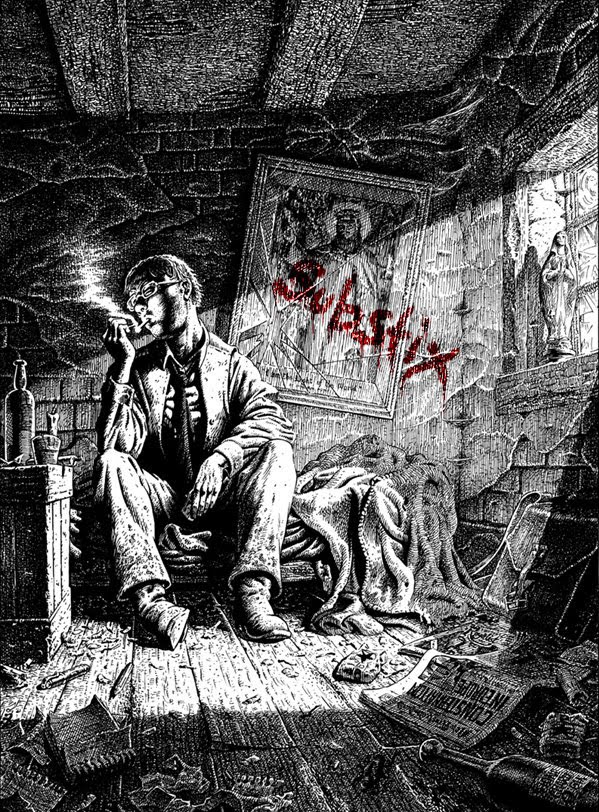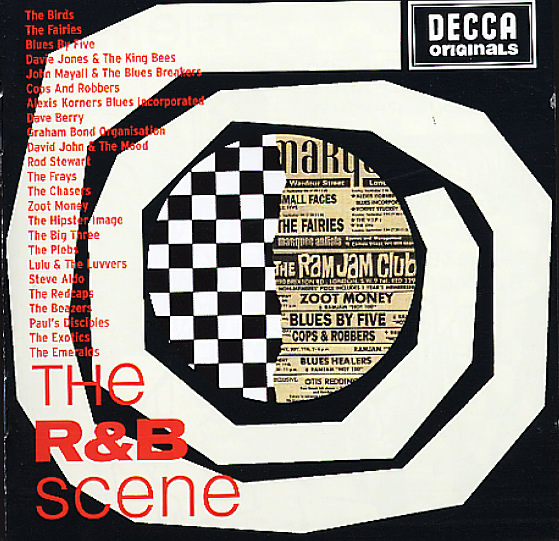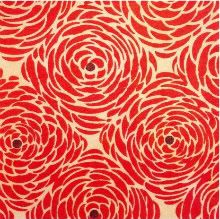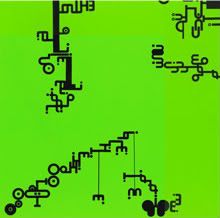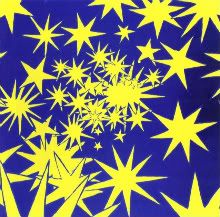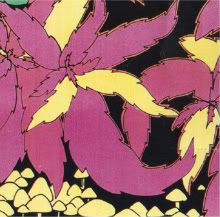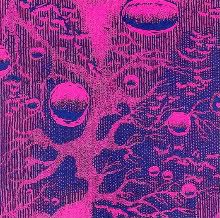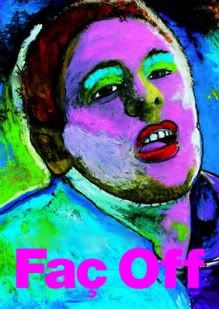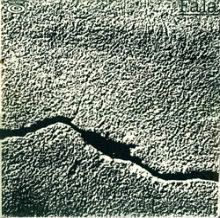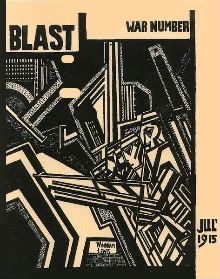Part 1 of a short series on
instrumental hip-hop.
Whilst DJs have been producing beats exclusively for MCs to spit over since the early 80's, hip-hop fashioned to be heard on its own is much less prevalent (it's yet to be
truly recognised as a genre of its own) but has yielded some truly intriguing results. With the exception of a few groundbreaking
cut & paste instrumentals and turntablism, non-specialist interest in 'just the beats' barely existed until the potential of hip-hop as a compositional tool was fully exploited by DJ Shadow's 'Entroducing...' album, the first album to be made entirely of sampled material (with a few seconds of interlude vocals recorded in studio).
Whether it be via breakbeats and
crate-digging à la Shadow or just navigating the intricacies of beatmaking on a digital workstation, once (good) hip-hop producers are freed of the limitations of having to craft a foundation for raps they can (and do) tend to go a bit mad. Variations and changes that would not have been considered before are indulged, often morphing the track into something that could no longer be called conventional
boom bap hip-hop or whatever.
This is why 'instrumental hip-hop' does not have it's own section in digital or physical shops - it too diverse, often crossing the border into electronica, downtempo, industrial, trip-hop... in fact just about anything, as these uploads will hopefully demonstrate.
One of the musical vignettes from Ghost Dog (footage not from film)
I'd like to start with a master who is no stranger to a sequencer, and who's minimalist, kung-fu flick and Thelonious Monk-inspired beats were responsible for a renaissance in 1993. RZA (
Ruler, Zig-Zag-Zig, Allah in the
Five Percenter alphabet) was the mastermind, de-facto leader and producer of Staten Island, NYC's Wu-Tang Clan, a group who's hard-hitting sound once sold a hell of a lot of records but nowadays would be considered 'underground'. RZA's style must have been a revelation in the time of sluggish gangsta/
Funky Drummer conscious hip-hop, every bit living up to the dark spiritualism and espionage tactics of Wu-Tang's lyrics. It sounds
lo-fi, gritty and unique, whilst being extremely difficult to resist nodding your head to.
Since that initial period of success and the plethora of classic solo albums produced by Rizzer that followed, things started to tail off. The long-awaited
sophomore Wu-Tang album in 1997 was an overstuffed double-disc beast, flawed but with plenty o-
merit. The group however was in dissolution, and from this point on RZA turned more to live instrumentation and a pronounced 70's soul influence - whilst still crafting the
occasional classic. He is nowadays more prolific and better known for his movie soundtrack work. 'Ghost Dog' was the beginning of that and it marks a one-off return to the sound that made RZA a household name and minor deity within hip-hop.
The cult movie is an understated Jim Jarmusch effort which I really recommend tracking down, and with his history of East-meets-West themes and beat-crafting there could not have been a more perfect choice to produce the music than Mr. Turkey Swizzler.
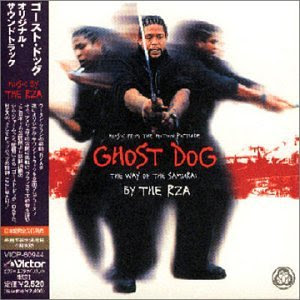
There were two soundtrack albums released, one was made up of RZA-produced rap tracks inspired by the film and released in North America (t'was so-so); the other was a Japan-only released and comprises of the much-vaunted score to the film, the excellent scratchy beats you hear throughout. In this upload I've also included a bunch of songs that weren't on the original release, like the music from the infamous
Cold Lampin' scene among others, these are tagged on the end.
The score itself is like the protagonist of the film, subtle and cold on the job but warm and reflective in it's quieter moments. For the most part, this serves as a prime example of typical instrumental hip-hop (typical for the RZA at least), in that you'll never question what type of music you're listening to. There are some beautifully humble percussive pieces and acoustic effects which I can only assume were recorded live; and the few samples used are done so sparingly, with RZA's expressive keyboard work taking the 4.
Most of the tracks are short and don't outstay their welcome, but there is one big exception: the infuriating 'Opening Theme (Raise Your Swords)' at track 2. Mark my words and avoid that one and you will get along just fine this album. Now not to downplay the up-front quality of the beats, but you'll also find 'Ghost Dog' makes great background/night-time music to accompany most PG-rated activities, with it's unobtrusive rhythm and dusky atmosphere. For fans of the film, it even has the
freestyle in the park as a nice little extra - what more could you ask for? Really? I'll end on a simple RZA quote I found, for anybody who somehow got through this entire entry and still thinks 'hip-hop' = Lil' Wayne.
''How has the South dominated hip-hop for the last four, five years without lyrics, without hip-hop culture really in their blood? Those brothers came out representing more of a stereotype of how black people are, and I think the media would rather see us as ignorant, crazy motherfuckers than seeing us as intelligent young men trying to rise and take care of ourselves.''Pt. 1Pt. 2

 I first came across Eleanor Rigby when I was questing after whether there were any Mod/Mod Revival female artists out there. While she was certainly inspired by Mod artists (doing a bunch of Kinks covers and the Rolling Stones' "Play With Fire") in music and her looks, she more frequently came off sounding like Debbie Harry, albeit a Moddier,and rougher-edged version. With currently less than 1,000 listeners on Last.fm, a bit of odd controversy, and her current whereabouts unknown, she remains an obscure, even slightly enigmatic figure. She only released one full-length album, Censorship, and her best-of collections Vol. 1 and Vol. 2, packed with a cheesy, yet tuneful assortment of tracks, are currently totally out of print. You can read more about her backstory at Mr. Suave's Mod Mod World.
I first came across Eleanor Rigby when I was questing after whether there were any Mod/Mod Revival female artists out there. While she was certainly inspired by Mod artists (doing a bunch of Kinks covers and the Rolling Stones' "Play With Fire") in music and her looks, she more frequently came off sounding like Debbie Harry, albeit a Moddier,and rougher-edged version. With currently less than 1,000 listeners on Last.fm, a bit of odd controversy, and her current whereabouts unknown, she remains an obscure, even slightly enigmatic figure. She only released one full-length album, Censorship, and her best-of collections Vol. 1 and Vol. 2, packed with a cheesy, yet tuneful assortment of tracks, are currently totally out of print. You can read more about her backstory at Mr. Suave's Mod Mod World.